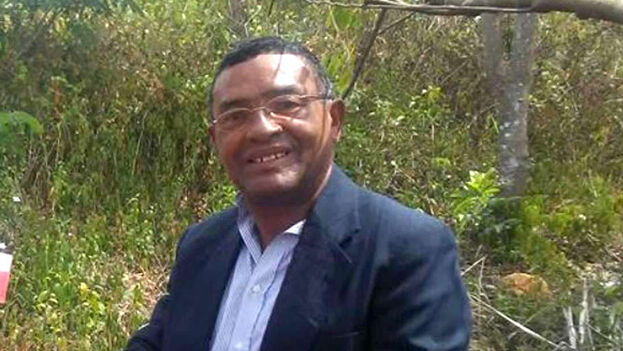
![]() 14ymedio, Havana, 14 October 2022 – On Thursday the Cuba Archive organisation requested the international community to mediate in the case of the political prisoner Carlos Manuel Pupo Rodríguez, national coordinator of the Union for a Free Cuba Party.
14ymedio, Havana, 14 October 2022 – On Thursday the Cuba Archive organisation requested the international community to mediate in the case of the political prisoner Carlos Manuel Pupo Rodríguez, national coordinator of the Union for a Free Cuba Party.
In their petition: Why does it ’not matter’ that Cubans are dying of hunger?, the organisation urges ambassadors and high-ranking representatives of distinguished international organisations on the island to make an appearance at the hospital where the prisoner is currently interned, and demand updates on his medical condition.
Pupo Rodríguez, who is serving his sentence at the Kilo Cinco y Medio prison in Pinar del Río — where the anti-establishment rapper Maykel Osorbo is also being held — was given an emergency transfer this week to the Provincial Abel Santamaría hospital where, after pleas from his family, he dropped his hunger strike.
“They have kept him locked in a small cell, deprived of water, medical help, telephone calls and family visits”, says the NGO, which has its headquarters in Washington; this must therefore qualify his case as one of cruel punishment on the part of State Security.
In the document, Cuba Archive also requires, from specialists on torture and cruel treatment at the UN, from the International Red Cross and from the inter-American Commission on Human Rights, that they demand the immediate release of Pupo, and of all political prisoners in Cuba. In addition, they ask that all these international agencies carry out inspections in detention centres without prior notice.
Similarly, they ask that the Cuban media reflect on the realities of what’s happening in the prison system, and that public servants safeguard any archives which evidence the abuse of human rights. In their message, the NGO recapitulates that since the start of the Castro dictatorship, there have been at least 1,748 registered deaths of dissidents in custody, 27 of them through hunger strikes.
The organisation also mentions the case of another Cuban prisoner Andy Reyes, a 27 year-old who went on hunger strike after being sentenced to 25 years for a crime he insisted he was innocent of. “He died on the fifty-second day of his strike, demanding a lawsuit review in the face of a judicial system which is subordinate to a one-party communist regime and which lacks legal guarantees”.
Likewise, they remind us that the Council for Reporting on Human Rights in Cuba has estimated that “over a thousand prisoners have lost their lives in the past decade through beatings, torture, ill-treatment, inhumane conditions and lack of medical attention”, a situation which brings some political prisoners to declare hunger strike.
Pupo Rodríguez is one of the political prisoners in particular danger. He has been on hunger strike twice, most recently for 21 days after being sentenced to six years for taking part in the 11 July 2021 demonstrations in San Antonio de los Baños (Artemisa).
Besides calling for democratic nations to cease all actions which legitimise, finance and support the Cuban dictatorship, and instead to impose sanctions upon all of the agents of repression — including judges, attorneys and police — Cuba Archive demands that the Cuban regime “dismantles their repressive apparatus and allows for a peaceful transition to democracy”.
The NGO rebukes the Cuban regime, not only for the fact that it enjoys “complete impunity”, but that it occupies seats in distinguished organisations, for example its elected membership on the UN Council for Human Rights (2021-2023) and the Executive Council of the Panamerican Organization for Health (2020-2023).
Neither the Red Cross nor any other international body are able to monitor compliance to human rights law in the more than 100 large prisons in Cuba, just as they not able to do so in the 150 smaller penitentiaries and 300 police centres. Nor does the Cuban government even provide information to families of detainees or families of those who die in prison.
Translated by Ricardo Recluso
____________
COLLABORATE WITH OUR WORK: The 14ymedio team is committed to practicing serious journalism that reflects Cuba’s reality in all its depth. Thank you for joining us on this long journey. We invite you to continue supporting us by becoming a member of 14ymedio now. Together we can continue transforming journalism in Cuba.
